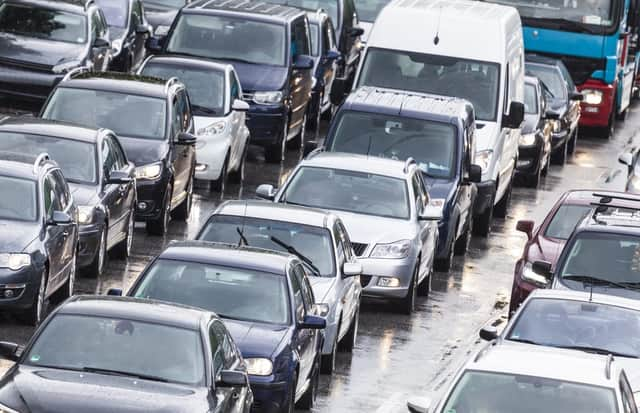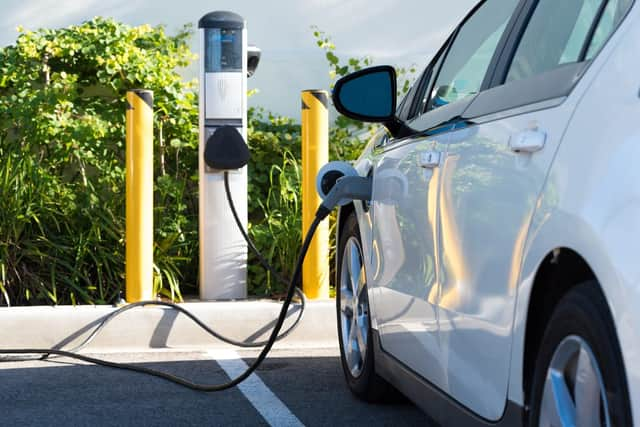Government advisers call for car tax increase and combustion engine ban by 2032


UK car tax should be increased and a ban on the sale of new petrol and diesel cars accelerated in order to tackle climate change, according to government advisers.
In its latest report the Committee on Climate Change (CCC) argues that such measures are needed to drive the adoption of low-emissions vehicles and help the UK meet its target of carbon neutrality by 2050.
Advertisement
Hide AdAdvertisement
Hide AdThe CCC says that with fuel prices driven down by the coronavirus pandemic, now is the right time to reform Vehicle Excise Duty (VED) to encourage a move away from traditionally fuelled cars. It has urged the Treasury to “provide stronger incentives to purchase zero emission vehicles and halt the shift towards larger, higher emitting cars”. As zero-emissions cars already pay no VED after the first year, this hints at raising taxes for other vehicles.
Its report says the coronavirus pandemic could be a defining moment on the route to carbon neutrality and notes: “Greater use of carbon taxes can support the public finances and strengthen incentives to reduce emissions. They are particularly attractive when global oil prices, and therefore consumers' energy costs, are low, as they are now.”
Changes to emissions testing and VED rules earlier this year saw a sharp rise in VED for buyers of some large heavily polluting models.
Petrol and diesel ban
The CCC report also calls on the proposed ban on traditionally fuelled vehicles to be brought forward by another three years.
Advertisement
Hide AdAdvertisement
Hide AdThe UK Government said last year that it was moving its target for a ban on all new petrol and diesel cars from 2040 to 2035. However, the CCC report says this is not ambitious enough and wants the rule, including a ban on all hybrids, moved forward to 2032.
The report notes: “The UK Government is consulting on bringing forward the date for phasing out petrol and diesel cars and vans (including hybrids) from 2040 to 2035 or earlier, in line with the Committee's advice. The Committee's assessment is that the date should be brought forward to 2032 at the latest, and backed by detailed policy arrangements to deliver it.


The CCC wants a ban on all but CO2-emitting cars brought forward to 2032 (Photo: Shutterstock)The CCC also says that the UK should set more ambitious regulations on reducing new vehicle CO2 emissions. Current EU guidelines are for maximum emission levels to be reduced every five years but the CCC wants more frequent reductions in the limits for the UK. It says: “There should be a rising mandate for car companies to sell a minimum share of zero-emissions vehicles, reaching 100 per cent by 2032 at the latest.”
Incentives needed
Ian Johnston, CEO of EV charging provider Engenie welcomed the CCC report. He said: “We have a once in a lifetime opportunity to bring about a step-change in low carbon transport. By taxing cheap oil and using the revenue to subsidise electric vehicles, drivers will have the confidence to make the switch to electric on mass, while also creating countless green jobs. Electric vehicles can be the driving force behind our economic recovery but the government must act on these recommendations immediately to avoid being left behind.”
Advertisement
Hide AdAdvertisement
Hide AdVix Leyton, from CarWow said that the Government should focus its efforts on “positive, decisive action now” to encourage alternative fuel vehicle uptake, including investment in charging infrastructure and support for a scrappage scheme.
She said: “We know schemes like scrappage work. Our German team has seen huge uplift in hybrid and electric cars since the subsidy was increased on June 4, with these cars now accounting for 64 per cent of all new searches.
“We cannot just expect people to make the switch altruistically before the proposed deadline of 2032; they need the confidence and support to do so."